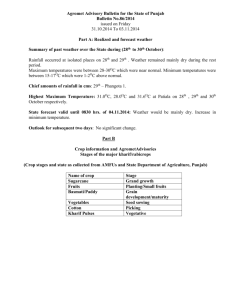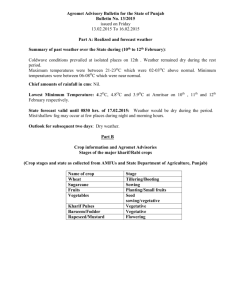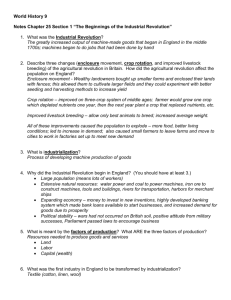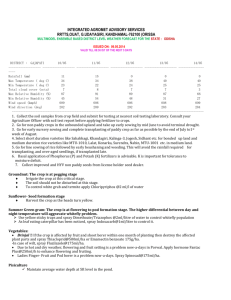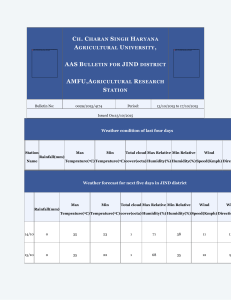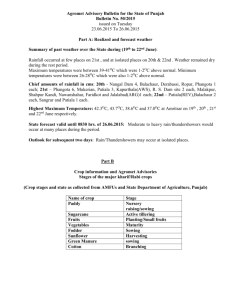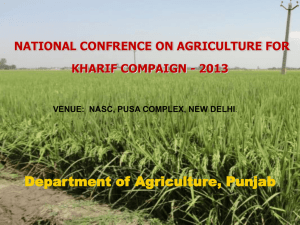Advisory Punjab 05.05.15
advertisement
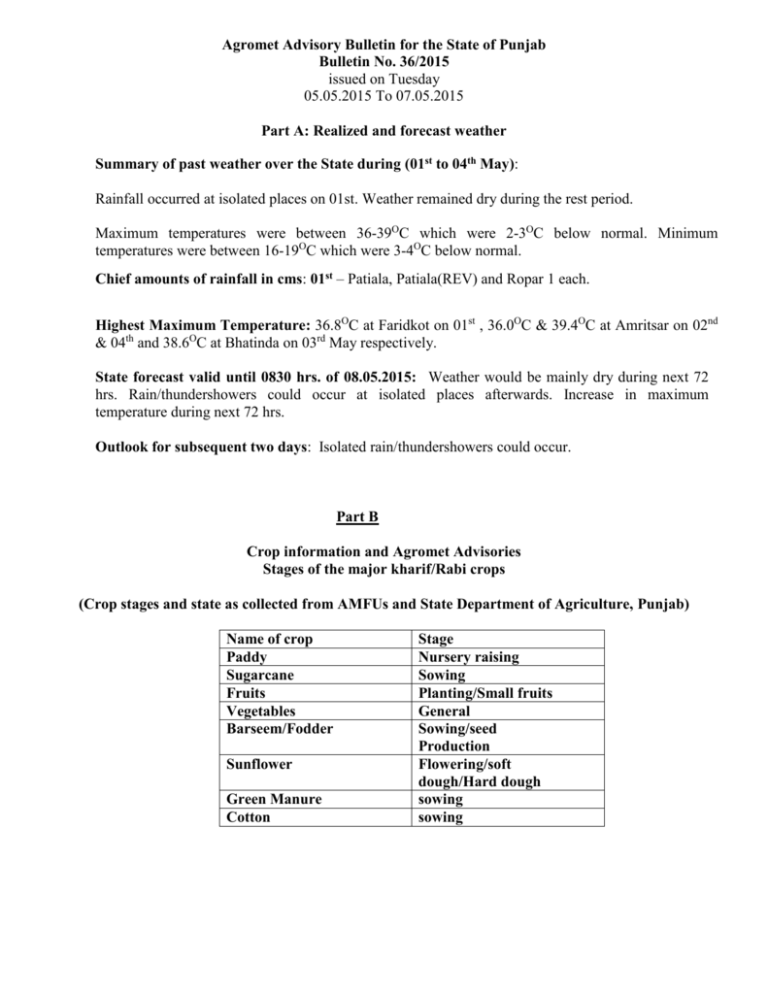
Agromet Advisory Bulletin for the State of Punjab Bulletin No. 36/2015 issued on Tuesday 05.05.2015 To 07.05.2015 Part A: Realized and forecast weather Summary of past weather over the State during (01st to 04th May): Rainfall occurred at isolated places on 01st. Weather remained dry during the rest period. Maximum temperatures were between 36-39OC which were 2-3OC below normal. Minimum temperatures were between 16-19OC which were 3-4OC below normal. Chief amounts of rainfall in cms: 01st – Patiala, Patiala(REV) and Ropar 1 each. Highest Maximum Temperature: 36.8OC at Faridkot on 01st , 36.0OC & 39.4OC at Amritsar on 02nd & 04th and 38.6OC at Bhatinda on 03rd May respectively. State forecast valid until 0830 hrs. of 08.05.2015: Weather would be mainly dry during next 72 hrs. Rain/thundershowers could occur at isolated places afterwards. Increase in maximum temperature during next 72 hrs. Outlook for subsequent two days: Isolated rain/thundershowers could occur. Part B Crop information and Agromet Advisories Stages of the major kharif/Rabi crops (Crop stages and state as collected from AMFUs and State Department of Agriculture, Punjab) Name of crop Paddy Sugarcane Fruits Vegetables Barseem/Fodder Sunflower Green Manure Cotton Stage Nursery raising Sowing Planting/Small fruits General Sowing/seed Production Flowering/soft dough/Hard dough sowing sowing Crop Advisories and Plant Protection: Wheat: The storage room must be cleaned properly before storing grains to minimize damage due to insects. There should not be any moisture source as it can further deteriorate grain quality. Soak the wheat seed in water from 8 AM to 12 AM on a hot sunny day. Dry in shade & store properly for next year sowing. Paddy: Make arrangements for sowing of paddy nursery during the second fortnight of this month. Grow recommended varieties like PR 121, PR 122, PR 118, PR 116, PR 114, PR 113, PR 111, PR etc. Apply 1215 tones of well-rotten farmyard manure / acre. Sugarcane: Control the weeds from the crop. However, for the control of dila, post-emergence application of 2, 4-D sodium salt80 % @ 800 g per acre in 200-225 litres of water is recommended. Do not sow moong / mash as inter crop, if sugarcane has been sprayed with herbicide(s). Irrigate the crop at 7-12 days interval for better growth of the crop. Apply 65 kg urea to ratoon crop. Cotton: Irrigate the field as heavy pre-sowing irrigation is beneficial for better germination and early establishment of cotton. Avoiding sowing Bt cotton in light sandy soils. Avoid sowing American cotton in/or near the orchards. Avoid growing bhindi, moong, arhar, castor, dhaincha in and around the cotton field to avoid simultaneous build up and spread of pests and diseases to cotton. Eradicate alternate hosts of cotton leaf curl virus/volunteer cotton plants before sowing, to avoid the multiplication and spread of diseases. Must soak delinted seed in water for 2-4 hours. Grow only recommended varieties/hybrids resistant/tolerant to cotton leaf curl viral disease. Grow only recommended hybrids Bt cotton RCH 650 BGII, NCS 855 BGII, Ankur 3028 BG II, MRC 7017 BG II, MRC 7031 BG II. Complete the sowing from April to 15 May. It will help to escape the attack of American bollworm to great extent. Grow non-Bt cotton as refuge on the periphery of Bt cotton to prevent development of resistance against Bt in bollworms. Sunflower: Since the weather is quite hot during this month, apply irrigations at 8-10 days interval. The crop should not be under stress at flowering, soft dough and hard dough stages. Control Cabbage semi-looper, tobacco caterpillar and Biharhairy caterpillars by spraying 200 ml of Nuvan 85 SL in 100 litres of water per acre. If necessary, repeat the spray after two weeks. These insecticides will also control jassid and other sucking pests. Maize: The farmers who have sown maize in end March or April are advised to look for the attack of maize borer. Remove and destroy the plants showing severe borer injury, while hoeing the crop. Spray the crop 2-3 weeks after sowing or as soon as borer injury is noticed with 40 ml Sumicidin 20 EC (fenvalerate) or Ripcord 10 EC (cypermethrin) or 80 ml Decis 2.8 EC (deltamethrin) using 60 litres water per acre. Animal Husbandry: Summer is approaching. So take adequate steps to protect the animals from summer heat and stress. Keep the animals and poultry sheds clean and dry. Regularly deworm the calves with piperazine liquid (4ml kg body weight) first at 10 days of age, then 15 days of age and then monthly upto 3 months of age and then 4 monthly upto 1 year of age. Make sure that all the animals are vaccinated against FMD. Increase protein level in the concentrate by increasing oilseedcakes by 5-7 per cent. Do not feed excess wheat/cereal to dairy animals. This can be fatal. It is best time to replace the stock. Reduce the thickness of litter and change the wet litter. Provide the cool and freshwater to birds. Provide sufficient water to avoid excess movement of birds. Proper vaccination schedule must be followed. White wash the poultry shed from outside especially roof. This will help to reflect the sun rays. Poultry: Vaccinate the chicks of 6-8 weeks of age with Ranikhet disease vaccine followed by fowl pox vaccine at 8-10 weeks of age. Deworm the pullets at 3 months of age and then regularly at one month interval. Vegetables: Light and frequent irrigation may be provided to the cucurbits namely round gourd, sponge gourd, bitter gourd and other summer vegetables viz. okra, and cluster bean, tomato, bell pepper, chilli, brinjal etc. Spray Omite 57EC@300ml or Kelthane 18.5EC@300ml or Fosmite 50EC@450ml using 150L of water on brinjal to control spider mite. Fruits/Horticulture: As the temperature rises rapidly, the growers are advised to adopt the measures to save their valuable fruit trees from drought, wind-storm and sun injury. Apply light and frequent irrigations to newly planted trees. To check zinc deficiency in citrus, spray the affected trees with 0.3% zinc sulphate (3g/litre of water) solution, without addition of lime, to spring flush. Green Manure: Farmers are advised to sow the green manure crop (cluster bean, daincha, lobia, sunhemp etc), where harvesting of rabi crop is over. Fodder: Take last cutting of barseem which is to be kept for seed production. As temperature is rising, Barseem crop for seed production should be frequently irrigated keeping in view of rainfall activity. Grow mixture of non-legume and legume fodder crop viz. Maize & Cowpea to get more nutritious feed for animals. General: Deep ploughing of fields after harvesting of wheat and mustard crops is advised so that eggs and pupating stages of insects and weed seeds are destroyed. Do not burn wheat straw after harvesting.
